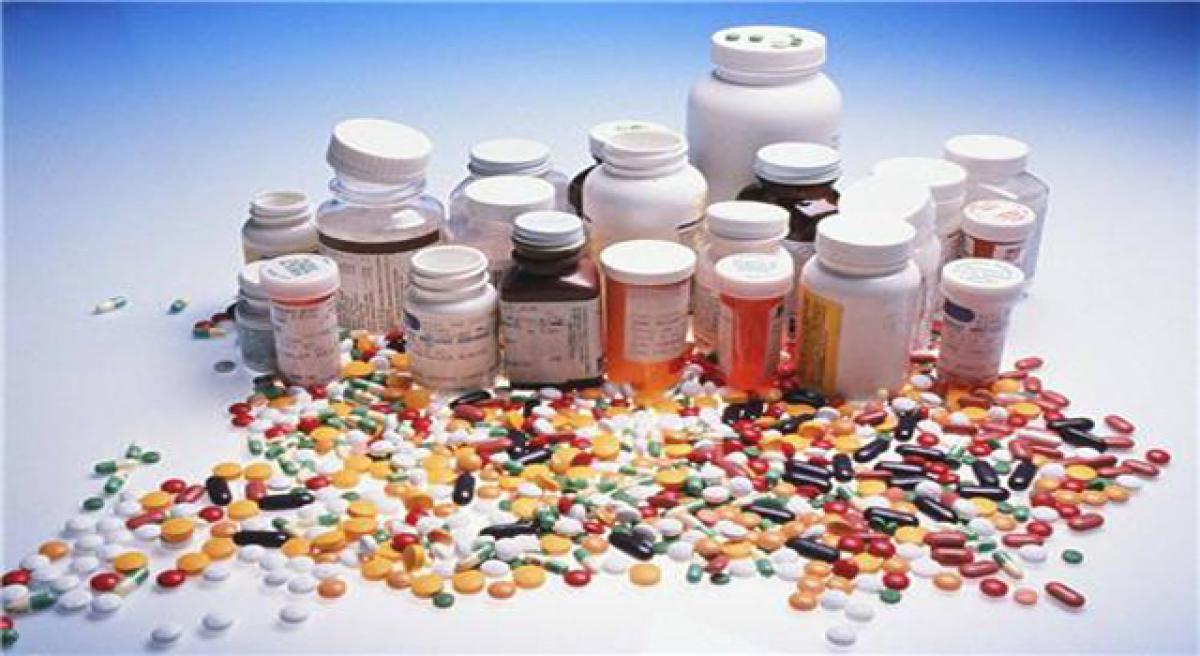Live
- Visakhapatnam: INS Sahyadri participated in the maritime partnership exercise
- Scorching heat fails to deter netas from revving up poll drive in Hyd
- Guntur: Dokka Manikya Vara Prasad resigns from YSRCP, joins TDP
- What they want: Women voters pitch for jobs, gender equality in Hyd’bad
- Vijayawada: Lanka Dinakar alleges norms’ violation in Axis Energy projects
- Nominations of 158 candidates found valid in Prakasam dist
- Anantapur: These will be last democratic polls if Modi returns, warns CPI
- EC rejects former MP Manda’s nomination
- Tirupati: ‘Work hard for the victory of Srinivasulu’
- Bad omen for BRS as more leaders look to jump ship
Just In

With government turning a blind eye, the medical bills of poor are raising steeply in the State. Adding to their woes, the non-availability of basic drugs and medicines at dispensaries is forcing patients to buy them from private medical shops. Cashing in on government\'s apathy, medical shops have mushroomed in and around several government hospitals in the city.
Hyderabad: With government turning a blind eye, the medical bills of poor are raising steeply in the State. Adding to their woes, the non-availability of basic drugs and medicines at dispensaries is forcing patients to buy them from private medical shops. Cashing in on government's apathy, medical shops have mushroomed in and around several government hospitals in the city. Their business is thriving, considering that there are 10 such stores on the premises of Gandhi Hospital and 30 shops near Nizam's Institute of Medical Sciences (NIMS), Punjagutta.
Komaramma of Warangal, who came to Gandhi Hospital for getting her son treated, pours out her woes to The Hans India, "With no medicines in the dispensary, I am forced to purchase them at high cost from outside. We already incurred debts to meet the hospital and medical bills". Like Komaramma, there are hundreds who approach the out-patient wings in government hospitals. While doctors prescribe medicines for a week, they buy medicines only for three days with the cash available.
A person has to spend at least Rs 10 for the daily dose of Cetrizen and Paracetamol tablets. A Pantoprazole injection costs Rs 100. Each Azithromycin tablet for treating ear, throat infection and skin allergy is priced at Rs 30. A single dose of Piperacillin comes at a price of Rs 600. A Metaphin sugar tablet costs Rs 50. Consumption of such medicines twice for a week costs around Rs 500.
In this scenario, the demand for free supply of medicines by the government is rising. Convener of AAP Prof P L Visweshwar Rao wondered why the Telangana government wasn't making them available to the needy people. "If Chief Minister K Chandrashekar Rao is serious about public welfare, he should take steps to make available the medicines at cheaper rates at all government hospitals," Rao said, adding that the trade of medical shops fell by 20 per cent in Delhi after Kejriwal government started providing free medicines in mohalla clinics.
"Is this not possible in the State," he asked, while referring to the practice in Tamil Nadu where the government has been extending the facility for the last 20 years with the TN Medical Services Corporation. "With a budget of Rs 500 crore, the corporation purchases medicines directly from pharma companies. The Tamil Nadu government is able to procure medicines at 25 per cent lesser cost than that prevailing in the market.
This policy should be implemented in Telangana," opined Jana Vignana Vedika vice-president Raju. He told The Hans India that the organisation was able to supply BP and sugar tablets for a month to the needy at only Rs 100, as it procures them directly from companies, avoiding middlemen. Associate Professor of Gandhi Medical College Dr Ramadevi said, "If the State Medical Services and Infrastructure Corporation could limit its task to only purchase and supply of medicines without the involvement of middlemen, the poor would benefit."
Meanwhile, people’s organisations want the State to increase its annual fund allocation for purchase of medicines of Rs 225 crore, pointing out the TN Corporation spending Rs 500 crore. Amounts for beds, bed sheets and saline stands are being met from the budget leaving only nominal funds for purchase of medicines. All India Democratic Women's Association (AIDWA) leader Ashalata, who undertook a study for over 20 days said, "There is a shortage of medicines in government hospitals though government fails to agree."

© 2024 Hyderabad Media House Limited/The Hans India. All rights reserved. Powered by hocalwire.com







